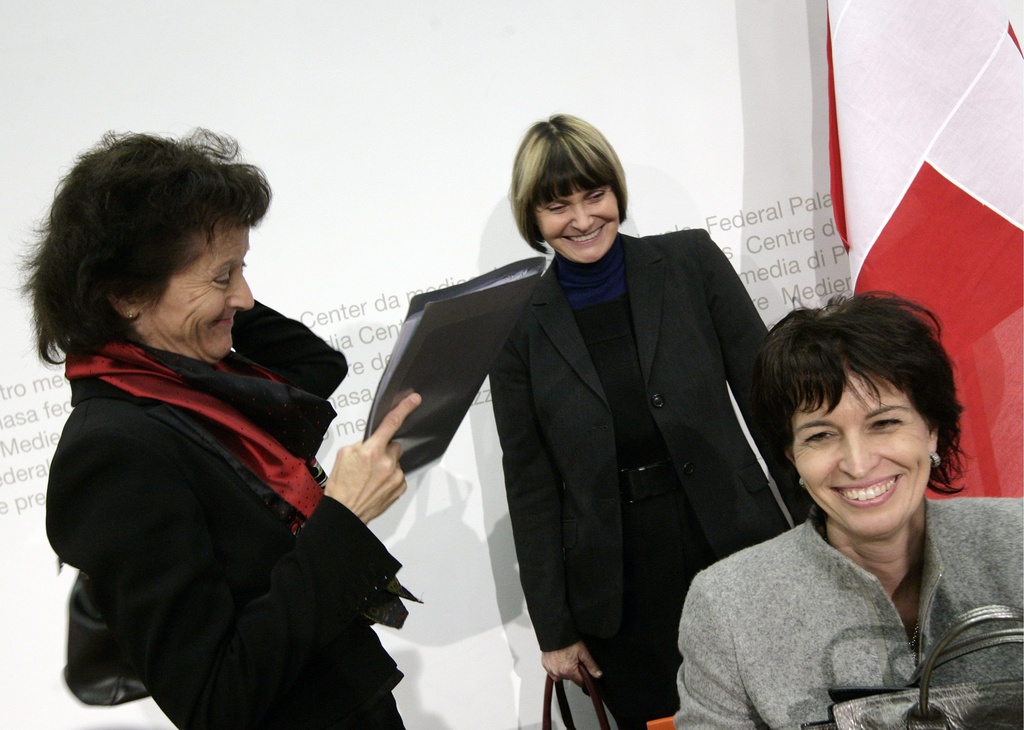Political system to survive cabinet shake-up

Finance Minister Hans-Rudolf Merz has announced his resignation – the fourth cabinet member to step down before the end of the current legislative term.
But experts say the stability of the Swiss government system with its seven-member multiparty cabinet is not under threat.
“Resignations before the end of the term are part of Swiss politics,“ says Michael Hermann, political scientist at Zurich University.
He adds that every resignation of a minister has its own history.
“Compared with changes in countries with a system of government and opposition a resignation of a Swiss minister has only a minor impact on the system,” he says.
However he points out that the fourth resignation in three years shows that it has become more difficult for a cabinet minister to resist pressure by political parties and the media.
“In this sense Switzerland is adapting to other countries,” says Hermann.
In July Transport Minister Moritz Leuenberger announced he will leave cabinet at the end of the year.
In the previous two years, Interior Minister Pascal Couchepin and Defence Minister Samuel Schmid also stepped down.
The four-year term is only due to end at the end of 2011 following parliamentary elections in October next year.
Changes
Hermann believes that the two forthcoming votes by parliament to choose successors for Merz and Leuenberger will not change the party-political balance in the cabinet.
The seven-member body is made up of two representatives of the centre-right Radicals and the centre-left Social Democrats and one seat each for the centre-right Christian Democrats and Conservative Democrats as well as the rightwing Swiss People’s Party.
But the Radicals could still be the main beneficiaries of the reshuffle, according to Hermann. That is because Merz’s successor will be elected in September and Leuenberger’s only in December.
“They will be able to secure their second seat now and have a tactical advantage over the Social Democrats. What’s more they have new faces to present in the campaign for next year’s general election.”
The Social Democrats could have difficulties placing their favourite candidate in cabinet, because parliament might not want a fifth woman in cabinet or two representatives from the same region of the country.
Challenges
The People’s Party has announced it will challenge both seats in the elections in September and December.
The Greens – the biggest political party not represented in the government – said it would present a candidate for Merz’s succession.
With such a scenario a political deal between the Social Democrats and the Radicals is likely, according to Georg Lutz, a political scientist at Lausanne University.
He says such an understanding would make sense for both parties to ensure their seats, as cabinet elections have become ever more complex and unpredictable over the past few years.
For Oscar Mazzoleni, a political scientist who works at Lausanne University and for a political institute in the Italian-speaking canton Ticino, two new cabinet ministers could help boost the credibility of the Swiss government abroad.
“In particular Finance Minister Merz was often the target of criticism,” he says.
Human touch
At a news conference on Friday Merz said he thought the timing of his resignation was right as some of the major issues had been resolved and the federal finances were in good shape.
His party praised him as “Europe’s best finance minister” who had succeeded in reducing the federal debt by more than SFr20 billion ($19.3 billion).
However his critics say Merz was slow in tackling the crisis over the UBS bank when it came under fire by the United States over allegations of tax evasion.
They also said he weakened the country’s cherished banking secrecy and failed to resolve a serious diplomatic crisis with Libya.
“He will be remembered by the public as a cabinet minister who acted and communicated without the necessary finesse,” said Lutz.
For his part Merz said he had no regrets but admitted that not everything had gone smoothly.
“I don’t hold any grudge against the media. Politicians have to be able to take criticism. But it’s true sometimes we worked very hard and the result was very modest.”
Merz thanked all his employees in his ministry for their loyalty and said it had been an honour to serve the country – seven years as a senator and seven years as finance minister.
“But the next seven years belong to me,“ he said with a broad smile on his face.
Urs Geiser, swissinfo.ch (with input from Renat Künzi and Isabelle Eichenberger)
Merz, 67, entered politics in 1997 when he joined the Senate as representative of his rural canton Appenzell Outer Rhodes.
In December 2003 he was elected to the cabinet for the centre-right Radical Party.
He held the portfolio of finance minister and also the largely ceremonial post of Swiss president in 2009.
He suffered a heart attack in September 2008 and returned to work six weeks later.
Merz had a career as a management consultant before he entered politics and is considered close to the business community.
Swiss cabinet ministers do not answer to their parties and there is no possibility to impeach them.
They are free to choose the moment of their resignation themselves and they enjoy considerable autonomy in the cabinet.
The cabinet members have to be confirmed in their posts every four years in the wake of parliamentary elections.

In compliance with the JTI standards
More: SWI swissinfo.ch certified by the Journalism Trust Initiative














You can find an overview of ongoing debates with our journalists here . Please join us!
If you want to start a conversation about a topic raised in this article or want to report factual errors, email us at english@swissinfo.ch.